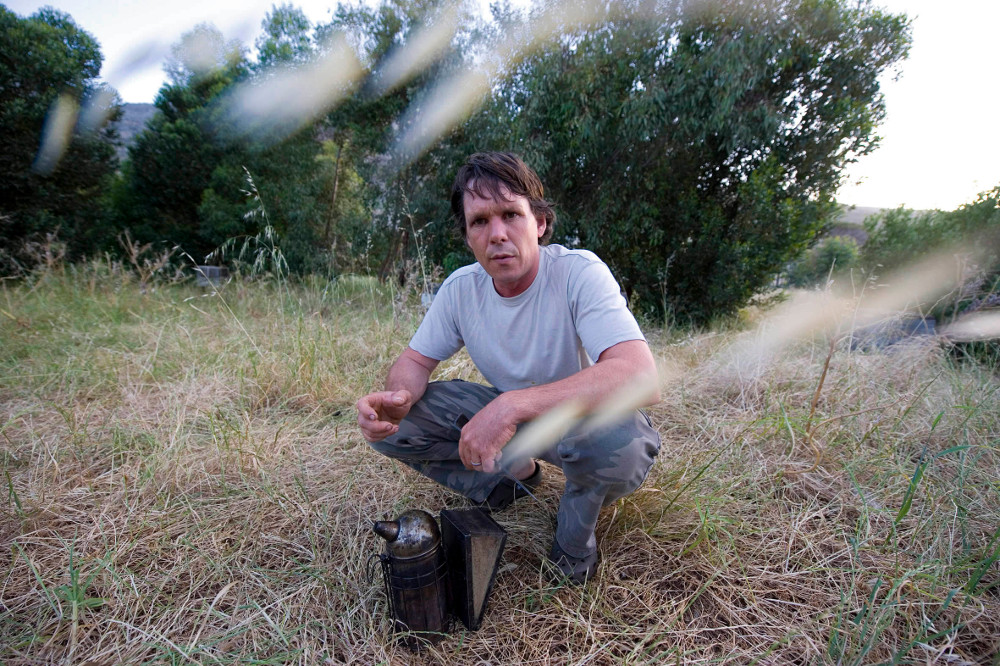Bee farmer Brendan Ashley Cooper shows some of his hives that have been infected by American foulbrood disease.
Albert Einstein is erroneously quoted as saying, “If the bee disappeared off the surface of the globe, then man would only have four years of life left.” Although nobody knows who said it first, it does indicate the importance of the black-and-yellow insect.
Bees are a critical part of our food cycle but a disease is wiping out entire colonies and hives in key areas in South Africa. A R20-billion industry – of pollination, honey, and beeswax – is in danger of vanishing. “We are somewhere between a crisis and a catastrophe,” says Mike Allsopp of the Agricultural Research Council. He has been warning of a collapse of African bees for the past two decades and is an outspoken proponent of bees being given more attention.
“Bees are more important than any other domesticated animal because they are indispensable when it comes to our food security.”
But, he says, nobody listened and followed through with action because the population had historically survived any disease that came ashore. “We have been cursed by our own success.”
Because the African bee is hardier than any other bee species, local beekeepers became complacent and responses to any outbreak were left without planning, he says.
The problem is a bacterium that causes American foulbrood disease, and an outbreak has killed off 40% of the bees in the Western Cape this year. The bacteria are ingested by larvae in bee colonies. These grow until they kill their hosts, leaving a corpse with more than 100-million infected spores. Other bees then get infected when they come to clean the hive and spread the bacterium, which can survive for half a century and only fire kills it.
Fertilisation
The Food and Agriculture Organisation (FAO) of the United Nations says the bacterium has been around for a century and plagues bee colonies in much of the world. Without bees, farmers cannot fertilise their crops cheaply and in an environmentally friendly way. Two-thirds of the world’s food crops rely on bees for fertilisation, it says.
The common practice among big producers, such as the United States, is to treat infected colonies with antibiotics. This keeps the bees productive and kills off the immediate outbreak of foulbrood, the FAO says.
But this presents the South African bee industry with a dilemma. Several local beekeepers say there is a split between those who want to use antibiotics because they have to meet large orders to fertilise farms and those who are worried about the dangers of antibiotics.
Brendan Ashley Cooper, a beekeeper and member of the Western Cape Bee Industry Association, says he lost 30% of his bees in an outbreak of foulbrood in 2009. He has since brought that death rate down to 1%.
“In big markets, FBD [foulbrood] is being managed using antibiotics and pesticides on an industrial scale. But, in South Africa, we have always prided ourselves with managing our colonies, so we do not use chemicals.”
This makes the bees’ other products – honey and beeswax – more valuable and means farming is better for the environment.
‘Natural selection’
His solution is to “speed up natural selection” by killing any bees that exhibit symptoms. This leaves the stronger bees, which should hopefully become more resistant to foulbrood, he says. “If we use antibiotics you mask the problem and the FBD will evolve until it is drug resistant.”
This year he lost 15% of his colonies, each with about 50 000 bees, because he became lax and stopped managing the population, he says.

Brendan Ashley Cooper says American foulbrood can be controlled by monitoring hives and killing those insects showing symptoms of the disease. (David Harrison, M&G)
Professor Theresa Wossler, a behavioural ecologist at the University of Stellenbosch, says nobody was prepared for an outbreak because the African bee is so hardy.
The outbreak was a shock for the industry and it is scrambling to find a solution, she says.
The commercial use of antibiotics is being adopted, but this only temporarily solves the problem, she says. “If we do like other countries have done and use antibiotics, we will mask its clinical symptoms and create drug resistance.”
The best solution is to find a colony of bees that have survived the disease and to use their resistance to save the local species. But this takes time and a great deal of luck, she says.
Threat to food production
Other beekeepers have lost more than half their bees, making it hard for them to meet orders. David Malan, of the South African National Seed Organisation, says that although the disease is currently isolated to one province, it threatens the whole country’s food production. “If we do not have bees to fertilise – and here we are seeing a clear threat to their population – we are facing a serious crisis.”
The growing industry means there is an ever-increasing need for bees and, without this, it would be hard to produce enough to feed people, he says. “We need an urgent response otherwise we are going to have our backs against the wall.”
That response should be coming from the department of agriculture, forestry and fisheries. Bees fall under its inspector services. But two different sources say the department does not have any inspectors overseeing beekeepers.
“We have the usual South African problem of great legislation but no implementation, and no consequences for people who ignore the legislation,” says one.
The department did not respond to questions before publication. But it has released press statements about the effect of foulbrood, saying it would greatly increase the cost of pollination and consequently the price of staple foods. It was waiting for the National Beekeeper Conference in May to evaluate the extent of the problem, and would work with the industry on solutions, it said.
*This article was changed to remove a quote erroneously attributed to the South African Bee Industry Association.